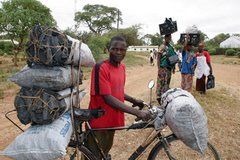While in Rwanda, I was challenged by my good friend, Bishop Josias Sendegeya, to develop a viable solution to some basic transportation problems they face, while stimulating the local economy at the same time. No small task, but one I felt called to attempt! One question the Bishop asked me during our conversation was, "Do you know why the Catholic Church has such a strong financial structure in Rwanda?" His answer was quite simple... "They are good at running businesses." The Bishop went on to explain how the Catholic Church ran many successful micro-businesses within the community. He finished our conversation simply stating, "Why can't we do this as well?" Indeed, why not us? Flash forward a few thousand hours...
I designed three models of trailers and developed a comprehensive business process to facilitate the success of indigenous micro-business implementation. The process is adaptable to any people group where the use of bicycles or motorcycles to haul goods and/or people is acceptable. Moving goods and people safer and more efficiently while stimulating economic growth are the key elements in the overall success of these project processes.
We must also be aware of the culture within which we are working. For instance, I had suggested we implement the “No Weld Wood Trailer” model as an alternative to the “Welded Steel Trailer”. However, I was quickly informed that in Rwanda the government would not approve of using wood based trailers. In fact, I was told that the government was quite excited about our initial plans to utilize steel in our manufacturing process. I have also heard that a few members of the government have already reserved their steel trailers from our first production run. The reason for the push to utilize steel rather than wood is because there is a dedicated reforestation effort by the entire country of Rwanda. I am happy to report RanCorp Services is part of a product and service that supports that effort. So we'll use steel instead of wood!
I will take many tools with me which are cost prohibitive to purchase in Rwanda. The extremely high cost of tools and materials is a challenge that the people of Rwanda face daily. The tools we will be utilizing are of high quality and will support many years of productivity.

Subscribe to:
Post Comments (Atom)






No comments:
Post a Comment